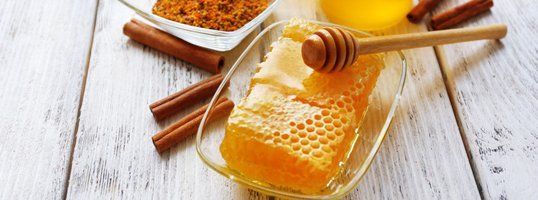Supporting copy for the Request Service
call out button.
Wax and Raw Pollen
Learn More About the Role of Wax and Raw Pollen
Health Benefits of Pollen
Pollen is the male part of the flower. It's a dust which is generally yellowish but may be red or purple. Pollen is made of 15-18% of water, 35% of carbohydrates, 20% of proteins as well as vitamins, minerals, amino acids which are lacking in honey. Bees account for 80% of pollination as they drop pollen on the pistil of flowers.
Pollen has antibacterial and antioxidant properties. It strengthens the immune system and protects against cell damage. It's a natural testosterone booster and builds muscles.

Wax Combs – Where the Bees Reside
Wax is produced by the workers, the only bees with the right glands under their abdomen. Wax is used as a structure material to make cells. Wax composition is stable; it weakly depends on the area or the bee species.
Unsurprisingly, the beekeepers provide premade cells to reduce the energetic expense of the bees and enable them to keep focused on making honey. It takes 2 kilograms of sugar to 1 kilogram of bees (a dozen thousands insects) to make 50 grams of honey.
Call us for emergency services and after hour appointments.
Competitively priced services at Alii Bee Company.
808-250-9794
About Us
Alii Bee Company is a locally and family-owned establishment. Our team has over 15 years of experience in the industry.
We provide top-class bee, wasp and bird removal service. You can also purchase unfiltered honey from us.
Call us for a
FREE estimate. Get our emergency services today!
Privacy Policy
| Do Not Share My Information
| Conditions of Use
| Notice and Take Down Policy
| Website Accessibility Policy
© 2025
The content on this website is owned by us and our licensors. Do not copy any content (including images) without our consent.


